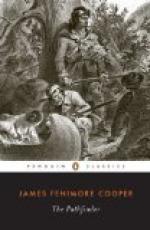Pathfinder stood leaning on his rifle, in the attitude described in the last chapter, a long time after the Scud had disappeared. The rigidity of his limbs seemed permanent; and none but a man accustomed to put his muscles to the severest proof could have maintained that posture, with its marble-like inflexibility, for so great a length of time. At length he moved away from the spot; the motion of the body being preceded by a sigh that seemed to heave up from the very depths of his bosom.
It was a peculiarity of this extraordinary being that his senses and his limbs, for all practical purposes, were never at fault, let the mind be preoccupied with other interests as much as it might. On the present occasion neither of these great auxiliaries failed him; but, though his thoughts were exclusively occupied with Mabel, her beauty, her preference of Jasper, her tears, and her departure, he moved in a direct line to the spot where June still remained, which was the grave of her husband. The conversation that followed passed in the language of the Tuscaroras, which Pathfinder spoke fluently; but, as that tongue is understood only by the extremely learned, we shall translate it freely into the English; preserving, as far as possible, the tone of thought of each interlocutor, as well as the peculiarities of manner. June had suffered her hair to fall about her face, had taken a seat on a stone which had been dug from the excavation made by the grave, and was hanging over the spot which contained the body of Arrowhead, unconscious of the presence of any other. She believed, indeed, that all had left the island but herself, and the tread of the guide’s moccasined foot was too noiseless rudely to undeceive her.
Pathfinder stood gazing at the woman for several minutes in mute attention. The contemplation of her grief, the recollection of her irreparable loss, and the view of her desolation produced a healthful influence on his own feelings; his reason telling him how much deeper lay the sources of grief in a young wife, who was suddenly and violently deprived of her husband, than in himself.
“Dew-of-June,” he said solemnly, but with an earnestness which denoted the strength of his sympathy, “you are not alone in your sorrow. Turn, and let your eyes look upon a friend.”
“June has no longer any friend!” the woman answered. “Arrowhead has gone to the happy hunting-grounds, and there is no one left to care for June. The Tuscaroras would chase her from their wigwams; the Iroquois are hateful in her eyes, and she could not look at them. No! Leave June to starve over the grave of her husband.”
“This will never do — this will never do. ’Tis ag’in reason and right. You believe in the Manitou, June?”
“He has hid his face from June because he is angry. He has left her alone to die.”




